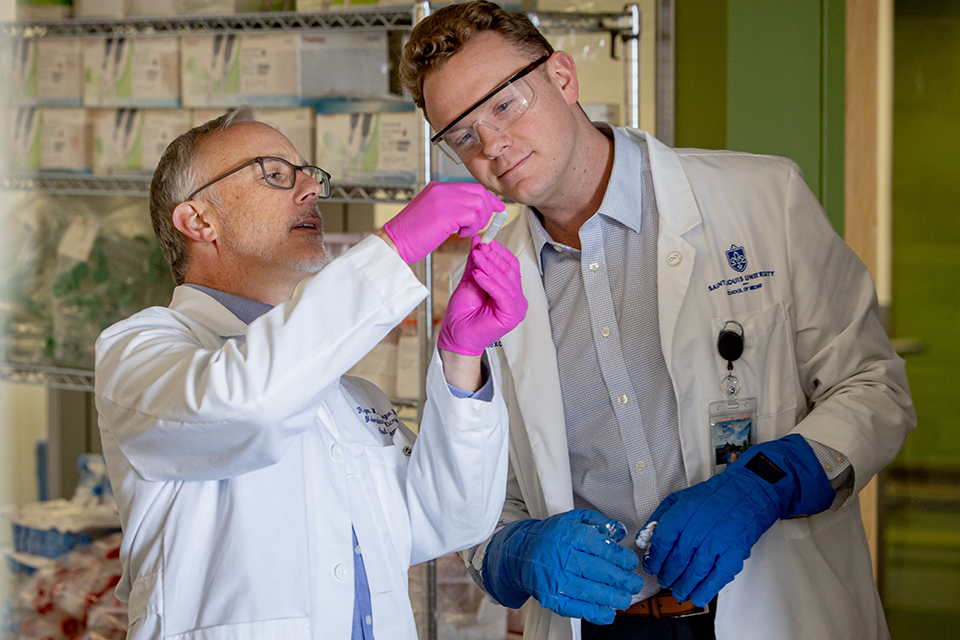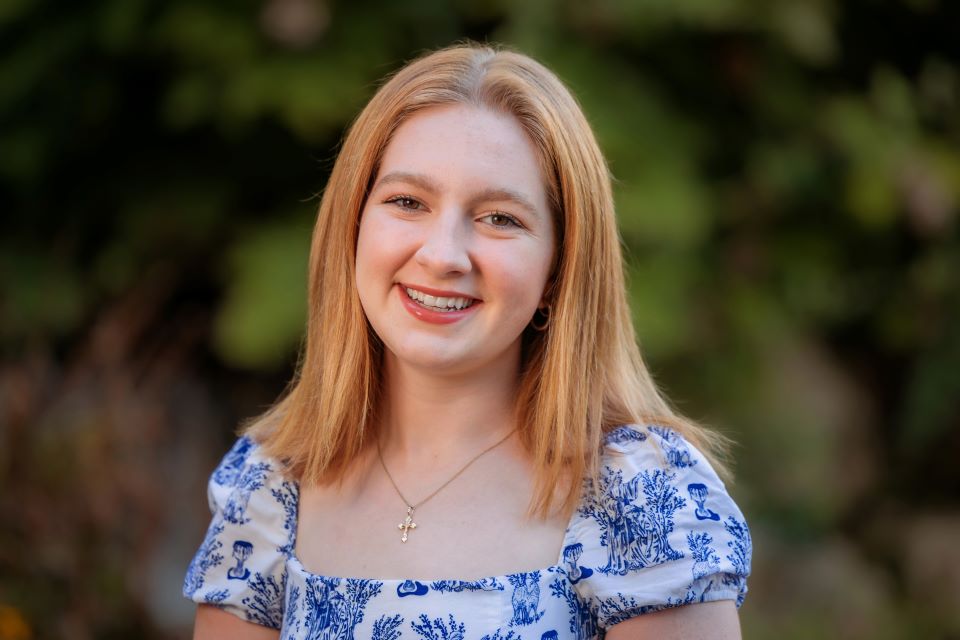SLU Study: Immune Dysfunction Increases Cancer Risk in Obese Populations
11/14/2024
ST. LOUIS —Researchers at Saint Louis University’s School of Medicine say T-cell dysfunction is leading to an increased risk of cancer in obese populations.
T cells are white blood cells called lymphocytes essential to your immune system in the fight against infections and cancer. Ryan Teague, Ph.D., professor of molecular microbiology and immunology at SLU, and his team are exploring why obesity impacts T-cell dysfunction and compromises immune surveillance, or the body’s ability to survey malignant cells and clear them before they become tumors.

Ryan Teague, Ph.D., left, and Alex Piening, an M.D./Ph.D. graduate student at SLU, work in the lab in Doisy Research Center on October 21, 2024. Photo by Sarah Conroy.
The study, which was led by Teague and co-authored by Alex Piening, an M.D./Ph.D. graduate student at SLU, was recently published in Nature Communications, found that T-cell dysfunction linked to obesity prevented T cells from detecting tumor cells, placing obese mice at higher risk of developing tumors when exposed to a carcinogen. Teague and his team are now trying to uncover the exact mechanism underlying the metabolic dysfunctions associated with obesity that directly impact T-cell function.
Ongoing projects in Teague’s lab at SLU are designed to identify barriers to successful cancer immunotherapy and develop strategies to overcome these barriers for improved patient outcomes. Teague and his team investigate how obesity impacts the efficacy of immunotherapies.
"Immunotherapy boosts a patient's immune system by targeting T cells and reinvigorating them. Paradoxically, immunotherapy is often more successful in patients with obesity, where the immune system isn’t functioning quite as well," Teague said. "Our research explains this paradox by showing that in the setting of obesity, developing tumors are only required to escape a weakened immune system. Such outgrown tumors are not well adapted to evade the reinvigorated T cells elicited during immunotherapy, and thus, are more easily destroyed."
Teague said single-cell RNA sequencing played a critical role in the study’s findings, which allowed scientists to learn what’s happening inside individual immune cells within tumors.
"We learned that the dysfunction in these T cells lies in their inability to kill tumors. Those genes were not being turned on. It also lies in their inability to acquire the metabolic functions needed to sustain anti-tumor activity," Teague said.
Thanks to SLU’s investment in single-cell RNA sequencing technology, the Department of Molecular Microbiology and Immunology has leveraged this new approach to advance its work studying cancer and the immune system, bringing us closer to new cures.
Other authors include Kelly D. Pyles, Kyle S. McCommis, Ph.D., Department of Biochemistry and Molecular Biology, Saint Louis University School of Medicine; Emily Ebert, Carter Gottlieb, Niloufar Khojandi, Lindsey M. Kuehm, Stella G. Hoft, Richard J. DiPaolo, Ph.D., Stephen T. Ferris, Ph.D., Elise Alspach, Ph.D., Department of Molecular Microbiology and Immunology, Saint Louis University School of Medicine.
Latest Newslink
- Kathryn Mitchell Pierce, Ph.D.: 1955-2025An obituary for Kathryn Mitchell Pierce, Ph.D., an associate professor at Saint Louis University's School of Education
- Saint Louis University Student Speaks About Leadership and Disability at Ignatian Family Teach-In for JusticeSaint Louis University senior Grace LoPiccolo shared her personal leadership journey at the 2025 Ignatian Family Teach-In for Justice. The event, held annually in Washington, D.C., is the nation’s largest Catholic social justice advocacy day.
- SLU Research Shows Surge in Alcohol-Related Liver Disease Driving ‘Deaths of Despair’Researchers at Saint Louis University School of Medicine say deaths from alcohol-related liver disease have surged in recent years, and the increase is hitting people without a college degree the hardest. While nearly every demographic group is seeing higher death rates—including those with college degrees—the gap between economically disadvantaged groups and more affluent ones is growing, according to new research.
- Saint Louis University Joins Multi-Disciplinary Research Team to Enhance Stress Resilience in SorghumSaint Louis University is part of a multi-disciplinary team, led by the Donald Danforth Plant Science Center, to deepen the understanding of sorghum, a versatile bioenergy crop, and its response to environmental challenges.The U.S. Department of Energy (DOE) Biological and Environmental Research (BER) program supports the three-year $2.5 million project for Genomics-Enabled Understanding and Advancing Knowledge on Plant Gene Function. Saint Louis University will receive $437,039 for its portion of the study.
- SLU Graduates Celebrated at Midyear CommencementSaint Louis University celebrated its Midyear Commencement on Saturday, Dec. 13, inside Chaifetz Arena. More than 1,900 guests watched as 600-plus SLU students walked across the stage and left as graduates.
- Why Do Raccoons Cross the Road? SLU, St. Louis Zoo Research Shows They Don'tA new study led by researchers from Saint Louis University, the Saint Louis Zoo, and partner organizations set out to understand how raccoons use space in one of the nation's largest urban parks.













